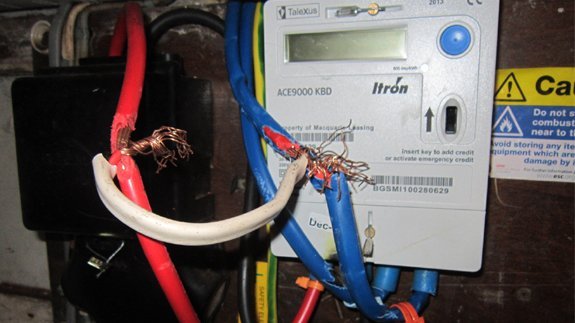how to bypass the electric meter
Energy theft is a serious issue that plagues many communities across the world. It not only affects the financial viability of the electricity distribution companies but also hampers the overall progress of a region. In this article, we will shed light on a recent incident of meter bypass in a community in Rivers State and discuss the repercussions of such an act.
Identifying the Culprit
The Port Harcourt Electricity Distribution Company (PHEDC) recently identified a community in Rivers State with the highest number of meter bypass cases. The act of meter bypass refers to the unlawful tampering or manipulation of an electricity meter to avoid paying for the consumed energy. It is an illegal practice that not only harms the electricity distribution company financially but also poses significant risks to the safety of the community and individuals involved.

The picture above showcases an instance of meter bypass, where the electricity supply has been unlawfully tapped before it reaches the meter. Such practices are carried out by individuals or even entire communities, leading to a loss of revenue for the electricity distribution company and creating an uneven burden on honest customers who bear the brunt of increased tariff rates.
The Dangers of Meter Bypass
While the act of meter bypass might seem harmless to some, it is important to understand the potential dangers associated with it. Firstly, meter bypass is a violation of the law and attracts severe penalties, including fines and imprisonment. Engaging in such practices not only disrupts the seamless functioning of the electricity distribution system but also undermines the reliability and trust in the system.
Furthermore, meter bypass poses significant safety risks. Improperly tapped electricity can cause short circuits, leading to electrical fires and electrocution hazards. The absence of proper metering and monitoring also makes it difficult to identify electrical faults or detect abnormal power consumption, which can further exacerbate these risks.
The Socio-Economic Impact
The impact of meter bypass extends beyond the individual or community directly involved in the act. Electricity distribution companies heavily rely on accurate meter readings to determine the energy consumption of customers and bill them accordingly. Meter bypass disrupts this essential process and leads to revenue losses for the company.
These revenue losses eventually trickle down to affect the entire electricity distribution network. The financial strain on the distribution company can result in inadequate infrastructure investments, leading to poor service delivery, frequent power outages, and a lack of necessary upgrades to meet the increasing demand for electricity.

Above is an image that captures a bypassed electric meter, as seen on YouTube. It serves as evidence of the detrimental effects of meter bypass and highlights the need for immediate action to curb such illegal practices.
The Way Forward
The fight against energy theft requires a cohesive effort from several stakeholders, including electricity distribution companies, regulatory authorities, and the communities themselves. It is crucial to raise awareness among the public about the consequences of meter bypass and educate them about the proper usage of electricity and the importance of fair billing.
Electricity distribution companies should invest in advanced metering infrastructure that incorporates tamper-proof technology. This can help detect instances of meter bypass and facilitate remote monitoring and data collection, enabling quicker response times and accurate billing.
Regulatory bodies should enforce stricter penalties for meter bypass offenders to serve as a deterrent. Collaborative efforts between the distribution companies and local law enforcement agencies can effectively identify and prosecute those involved in meter bypass cases.
Conclusion
The incident of meter bypass in the Rivers community serves as a wakeup call for all stakeholders involved. It highlights the urgent need to address energy theft and its repercussions on both the financial viability of electricity distribution companies and the overall development of communities.
It is essential for communities to realize that electricity theft has far-reaching consequences that extend beyond individual benefits. By fostering a sense of responsibility, promoting awareness, and encouraging fair billing practices, we can collectively eradicate energy theft and pave the way for a more sustainable and equitable electricity distribution system.

